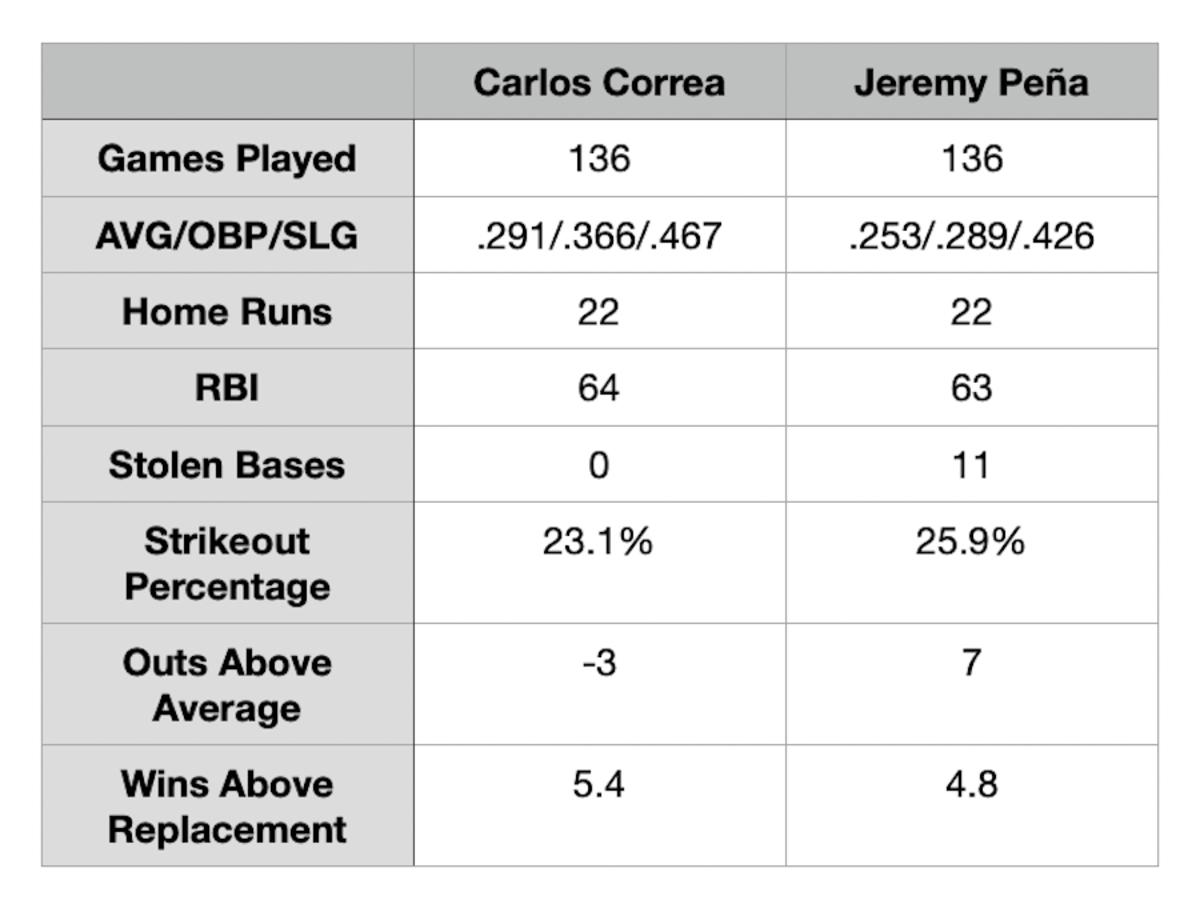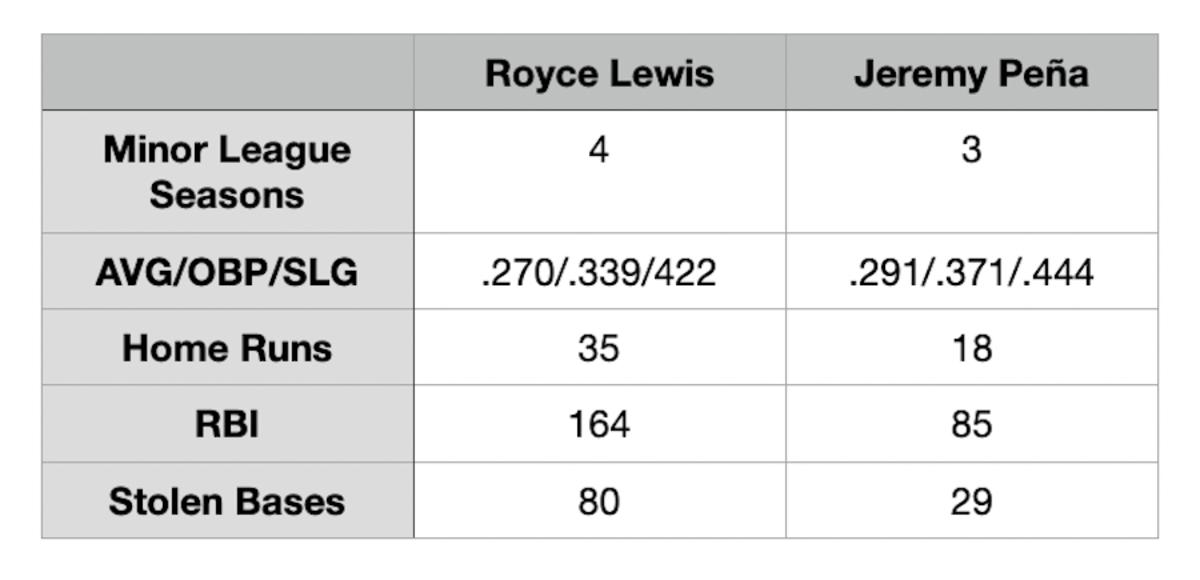Why the Twins shouldn't try to win a bidding war for Carlos Correa

On Friday, the Houston Astros will host the Philadelphia Phillies in Game 1 of the World Series. The Astros have had a successful season, winning 106 games and claiming home-field advantage in the American League.
They've ripped the AL playoffs, winning seven straight games and are now on the verge of their first title since 2017. And they've done it all without Carlos Correa.
A two-time All-Star and Gold Glove winner, Correa is a superstar worthy of the three-year, $105.3 million contract he signed with the Minnesota Twins last spring, but his presence didn't lead Minnesota to playoffs.
Instead, the Twins succumbed to several deficiencies on their roster and now have a decision to make: dole out a massive contract in a bidding war for Correa or feel the wrath of a jaded fan base.
The case to keep Correa is obvious. All-Star shortstops don't grow on trees and neither does one with the all-around ability that Correa has.
After getting off to a slow start, Correa's .834 OPS led all shortstops with a minimum of 300 at-bats. His 5.4 wins above replacement ranked fourth, his .291 batting average ranked fifth, and his 22 homers were sixth among this group.
We haven't talked about his status as an October legend as his 18 career postseason homers rank seventh all-time. That's because the Twins didn't get there but Correa's replacement in Houston did.
One of the big reasons the Astros let Correa walk was the presence of Jeremy Peña. If it weren't for Julio Rodriguez's emergence in Seattle, Peña could be the front-runner for the Rookie of the Year award, putting up comparable numbers to Correa.

To add to the value, Peña's season picked up where Correa's left off. The 24-year-old delivered a dagger to the Seattle Mariners' playoff hopes with an 18th-inning home run in the American League Divisional Series. He was named the MVP of the American League Championship Series after hitting .353/.353/.824 with two homers and four RBI in a four-game sweep of the New York Yankees.
Peña is the centerpiece of an Astros lineup that ranked eighth in runs per game this season (4.55) while the Twins ranked 16th (4.3) and Peña did it at a measly $700,000 while Correa made $35.1 million.
When it comes to the rest of baseball, it appears that less is more. The New York Mets had MLB's largest payroll at $219.5 million and got eliminated in the Wild Card round. The Los Angeles Dodgers ($124.6 million) and Atlanta Braves ($159.3 million) didn't make it out of the Divisional Round. The New York Yankees ($150.9 million) and San Diego Padres ($166.7 million) lost in the championship round.
You may think this is rhetoric reserved for "Pohlad Pocket Protectors," and the Phillies ($172.1 million) and Astros ($154.8 million) rank second and sixth in MLB's highest payrolls but this isn't about the money that's being spent. It's about using that money wisely to build a better roster.
The Astros were able to use the money Correa turned down to sign Justin Verlander to a one-year, $25 million contract. Verlander responded by going 18-4 with a 1.75 ERA.
The Philadelphia Phillies are paying five players over $20 million per season but two of them are pitchers (Zack Wheeler, Noah Syndergaard). They've also spent money on elite players while filling in the gaps with homegrown or cheaper acquired talent.
Meanwhile, the Twins were able to enjoy one season of Correa in the infield but forgot to upgrade some other areas of their roster.
Their starting rotation was a group of cost-effective options that either broke down (Chris Paddack, Sonny Gray, Tyler Mahle) or just weren't effective (Dylan Bundy, Chris Archer).
Their bullpen was an even bigger disaster as Twins fans watched Emilio Pagan give up 12 home runs (4th among MLB relievers) while the front office bragged about having him under team control through 2023.
Even when the front office spent money, it was on an underachieving group of players. Miguel Sanó made $9.2 million while hitting .083. Max Kepler had a career-low OPS while making $8.5 million. Gary Sanchez had a lower OPS (.659) while making $9 million.
You could even argue that the Twins' investment on Byron Buxton ($9.1 million) didn't pay off after he battled injuries the entire season.
Maybe Correa is a much safer investment than the players listed above but signing him to a 10-year deal would be overkill considering the Twins already have their version of Peña waiting to replace him.
Royce Lewis was the No. 1 overall pick of the 2017 MLB Draft and was the first player Derek Falvey and Thad Levine selected to begin their rebuild. Lewis's ascent to the major leagues took longer than expected but his minor league track record is comparable to Peña's.

If you want further proof, Lewis showed that he could be an adequate replacement last season when he hit .313/.405/.534 with five homers, 14 RBI and 12 stolen bases at Triple-A St. Paul in his first organized baseball games in over two years.
Lewis continued to rake by hitting .300/.317/.550 with two homers in 12 games and was set to play a super-utility role before tearing his ACL last May. The 24-year-old is now coming off his second torn ACL in a span of 15 months and won't be ready for the start of the 2022 season, but is it worth paying Correa as a $35.1 million (or more) stop gap or is it better to take the gamble for $700k and sign someone in free agency?
It might sound crazy, but that was the exact plan the Twins had when they traded for Isiah Kiner-Falefa last spring before finding an opportunity to dump Josh Donaldson's contract. If that never happens, there's a world where Lewis takes over at shortstop and Correa is pitching himself as a Dior belt somewhere other than a market that prefers Carhartt.
Signing Correa won't doom the Twins for the next 10 years, but it's a move that doesn't need to be made. With an opportunity to upgrade other areas of the roster, they can let Correa get the bag he deserves while also creating a better team back in Minnesota.
Related: Michael Kay says Donaldson trade with Twins will 'haunt' Yankees
